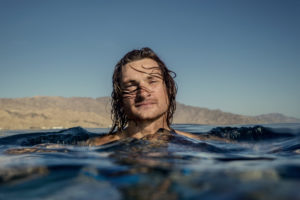 We recently caught up with Harry Chamas, holder of the British national freediving records for variable weight and no-limits freedving. Here’s what he has to say about freediving and how it shaped his outlook on life.
We recently caught up with Harry Chamas, holder of the British national freediving records for variable weight and no-limits freedving. Here’s what he has to say about freediving and how it shaped his outlook on life.
What motivated you to pursue the British national records?
Records have never been a source of motivation for me. I enjoy developing my skills and going deeper because it fascinates me. Freediving is so new that there is no set way to get better like there is in most traditional sports. For me to progress, I have to experiment and develop skills over a long period. This pioneer aspect of the sport suits me very well.
Over the years I built my skills to the point that I knew I could gain these national records, and I was working in the perfect place to set them, alongside the world-record holder in one of the disciplines. It’s nice to know that I’m the best in my country at something, but in the end, I don’t attach any meaning to it. I don’t see these records as my pinnacle — I’m just getting started.
What is the difference in freediving styles?
There are five different styles of ocean freediving. Constant weight means swimming down and up with fins or a monofin. Constant weight-no fins freediving means swimming down and up using a modified breast stroke. Free immersion means pulling down and up on a rope; variable weight means being pulled down by a weighted sled and swimming back up; and no-limits means being pulled down on a weighted sled and pulled up by a lift bag and compressed air. I hold the records in the last two disciplines.
How did you get into freediving?
I left England to begin traveling in 2009 and took a mask with me. When I went snorkeling for the first time in Thailand and began to dive down. I remember being so curious about what was down there — it was irresistible. Slowly it became a passion and I took some training in Dahab, Egypt where I learned about the sport of freediving. It has been a big part of my life ever since.
What did your training schedule look like for the event?
During the build-up to my attempts I was working as a freediving coach. This meant the only chance I had to train was early in the morning. But, due to the intensity of my workload, I couldn’t do this very often or I would become burned out. So, I did most of my training out of the water, using visualization and other mental training techniques to prepare my mind and accept the idea of going so deep without actually doing it. This advanced form of training is only possible after years of building up an understanding of your mind and body.
What’s next?
Coaching has always been a passion, so I plan on continuing to develop as a coach in Dahab, Egypt. I will continue to train and progress in my diving, but I am wary of attaching too much meaning to my depths. I’ve seen that the bigger deal you make about a depth, the harder it will become. So, not setting goals is a conscious decision to simply explore my capabilities.
How has freediving affected your life?
Freediving has been the inspiration to explore deeper into my mind and body. It is the reason I eat healthily, meditate, stretch, and hit the gym. Freediving requires an awareness and honesty with yourself that separates it from any other sport that I have ever participated in. It has allowed me to explore myself, meet wonderful people and make a living from my passion in amazing places around the world.
Tell me about the freediving subculture.
There is a whole group of people who have given up their “normal” lives and made freediving their life. This is such a beautiful decision because it comes from pure passion — there is no money in freediving, no sponsors, no government help, even for top-level guys.
The sport is so new that we are all pioneers, exploring new concepts, sharing ideas and experiences and growing together. There is no way to free dive without people that you trust to support you. Each time you dive, you entrust your safety and life into the hands of your buddy, which builds bonds and lifelong friendships.
Dahab, Egypt is the largest and oldest freediving community in the world. This is where I have decided to settle, in the stronghold of freediving, surrounded by my passion and the freediving bums that share that passion.

